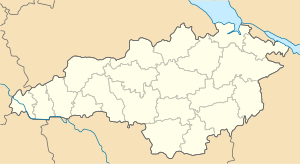Oleksandriia
| Olexandria Олександрія | |||
|---|---|---|---|
| City of regional significance | |||
 | |||
| |||
 Olexandria | |||
| Coordinates: 48°40′N 33°07′E / 48.667°N 33.117°ECoordinates: 48°40′N 33°07′E / 48.667°N 33.117°E | |||
| Country | Ukraine | ||
| Oblast | Kirovohrad Oblast | ||
| Government | |||
| • Mayor | Tsapyuk Stepan Kyrylovych | ||
| Area | |||
| • Total | 55 km2 (21 sq mi) | ||
| Elevation | 107 m (351 ft) | ||
| Population (2015) | |||
| • Total | 82,410 | ||
| Zip code | 28000-28019 | ||
.jpg)


.jpg)
Oleksandriia (Ukrainian: Олександрія, is a city located in Kirovohrad Oblast (region) in central Ukraine. Administratively, Oleksandriia is incorporated as a city of oblast significance. Ir also serves as the administrative center of Oleksandriia Raion (district), though administratively it does not belong to the raion.
In 2001 it had a population of 93,357, and including the villages (selo) and townlets in the city municipality a population of 103,856. Current population: 82,410 (2015 est.)[1].
History
The city is first mentioned in 1746, as the settlement Usivka (Ukrainian: Усівка, Russian: Усовка). The official record of the settlement is dated 1754 when in the region was built the Saint Elizabeth fortress (today Kropyvnytskyi). During establishment of the Russian colony of New Serbia in 1752-64, in Usivka was quartered the 3rd Company of New Serbia Pandurs. In place of Usivka was established encampment (sconce) Bechey (after the Serbian city of Bečej).
In 1784, the Russian government has given the settlement a Hellenic name of Aleksandriysk and later Aleksandriya (locally as Oleksandriya). In 1806-1922, Oleksandriya was a county (uyezd) seat.
On 6 August 1941 the Red Army of the Soviet Union left the city to the Nazi Germany Wehrmacht without fight. During the Nazi occupation, the city lost almost all its entire Jewish population (est. ~2,500). The Nazi administration also executed over 5,500 Soviet prisoners of war as part of the Nazi stance on the issue of the Soviet's not signing the 1929 Geneva Convention. The city was recovered by the Soviet armed forces on 6 December 1943. During the World War II most of the city's urban massif was left intact as there was no street fighting.
Places of interest
A popular place to visit in the town is Oleksandriia's square, known as Soborna Square ("Соборна площа").
People from Oleksandriia
- Yuriy Kravchenko, Ukrainian police officer and statesman (1951)
- Pyotr Koshevoy, Soviet military leader (1968)
- Leonid Popov, Soviet cosmonaut
- Sholom Secunda, Jewish-American composer (1894)
- Ihor Nenko, first Ukrainian and post Soviet Union athlete who swam across La Manche (English Channel)[2]
References
- ↑ "Чисельність наявного населення України (Actual population of Ukraine)" (PDF) (in Ukrainian). State Statistics Service of Ukraine. Retrieved 1 July 2016.
- ↑ Crossing the English Channel

